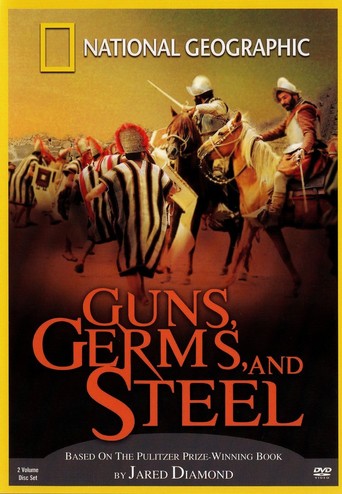indiepoppedhearts-174-356068
Quite a few reviewers are being far too harsh and expecting this to be something else that they watched. This does a good job of answering the question presented in regards to who asked the question, someone from New Guinea. It explains the limiting factors that keep a population from being able to free up enough of their individuals in order to allow them to focus on objectives not to do with getting food. There are more answers to the question if you change who asks it but in pertaining to the people that asked the question it does a good job of covering the basics of some of the bases.Yes, there are scenes of him failing at using some tools. It seemed to me like a demonstration that westernization means nothing to ability and intelligence.I would suggest showing this to just about anyone. While it doesn't cover all of the bases it puts the information it does cover in an easily understandable format and explains factors as simply as possible.
rsignal
I get that Prof. Diamond is trying to answer the big questions of "why?" some civilizations invented "cargo" (material goods) and others didn't. I have not read the book, and just watched the first episode of this miniseries.A lot of the details of the argument ring true to me. The worldwide distribution of beasts of burden, types of farm crops and weather patterns all certainly have an effect of the rise of civilizations. But this can't be the whole story, or even the major part.When showing Diamond interacting wit the New Guinea folks, the emphasis was on the New Guinea struggles to get food. Hunting is inefficient, and farming is difficult labor due to the crops and lack of domesticated animals. Okay - but what was really striking is what was the lack of a written language. At the end of the episode, Diamond says something to the effect that if only geography had been different, then the New Guineans would have invented the helicopter, and not Westerners.The problem with this argument, is that in order to invent a helicopter, you must first understand fuel, energy, materials, densities, air molecules, physics, weather, and hydraulics, just to name a few things. I agree with Diamond that the New Guineans are plenty smart to understand all those things, but in order to generate knowledge, a society must have a physical way to disseminate knowledge (scrolls, printing presses, paper, etc) and culture of acceptance of new ideas (criticism of new ideas is fine, indeed necessary to refine knowledge). Diamond didn't discuss the role of culture at all, and this is a huge omission.Ultimately any theory of the rise of civilizations can be supported by cherry-picking data. This is a historians job, not a scientific endeavor. Diamond has his theory, and any number of people have their own theories. I personally don't find Diamond's theory to be very compelling.
ed_two_o_nine
This is a documentary I came across by chance on the UK TV channel More4 and I have to say I found it extremely interesting and thought provoking. I will also be seeking out the book that was the source material for this documentary. Basically this is Professor Jared Diamond theory on why certain parts of the earth's societies prospered and others did not. The argument he presents was new to me and argued about how the fortune of the right crops and the right animals that where able to domesticated is certainly a compelling one. As for the documentary itself it is well shot and well narrated with not to much of the re-created scenes that spoil many a modern documentary. Diamond also helps by not being to condescending which is a fault of a lot of intellectuals when trying to get a message to the masses. People have claimed his theory is Marxist but I do not buy this and see it more socio geologist. It was also refreshing to hear an theory on the evolution of society not based around religion. Highly recommended viewing.
j_reece
Having read Diamond's book, I was slightly disappointed in the series, but all in all, it is quite informative. Reading the other comments, it is comforting to know that the 'culture warriors' are hard at work, seeing 'attacks' on 'Western Civilization' under every rug.Is Diamond a little preachy ? Sure. Like a lot of academics, he sees his theory as the most important thing ever. He uses the phrase 'guns, germs, and steel' at seemingly every opportunity during the series. We get it, after about the first 10 minutes.Is Diamond a little simplistic (in the series) ? Sure. The part about the Spaniards in South America is particularly amusing, condensing some very long, complicated history down to 'smallpox, swords, and horses', wrapping up the whole conquest of South America in about 15 minutes. But the point remains valid - these things did in fact contribute (but not totally define) the reasons for the Spaniard's success against the established cultures.Is he preaching *against* Western Civilization in any way ? Nope. Not a word. Not to my ear. All he says is that luck played a large part in determining which cultures advanced more quickly, *not* that luck is the only reason.In the end, if you're looking for something that validates your own sense of superiority, then this series is not for you. But if you are interested in all of the factors than influence how societies succeed or fail, this series presents a useful interpretation of the historical evidence.


